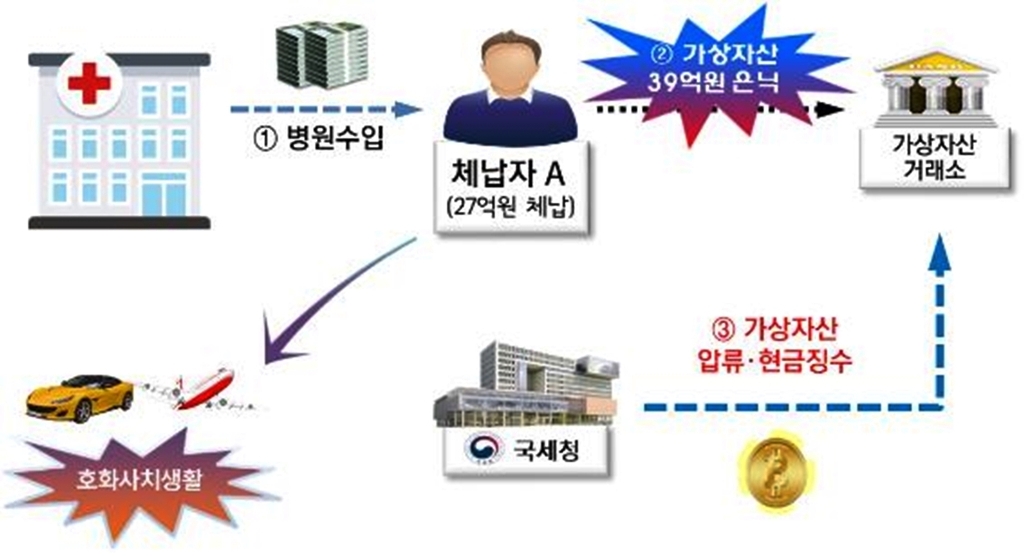Sending time2021-03-15 12:00
comment
The revision of the Special Privileges Act also played a part… Authorities “Receive periodic reports on the status of virtual currency holdings from the exchange”

[국세청 제공. DB 및 재판매 금지]
(Sejong = Yonhap News) Reporter Ha Chae-rim = # A, who runs a hospital in Gangnam, Seoul, has a delinquent total income tax of 2.7 billion won while living a luxurious and luxurious life. Recently, the National Tax Service confirmed that A concealed the income from the hospital as a virtual asset (virtual currency) worth 3.9 billion won, and seized his virtual currency through a virtual asset exchange. When virtual currency prices soared and it was impossible to withdraw them in cash, A paid the full amount of the arrears in cash.
# B was in a state of arrears in paying the gift tax of 2.6 billion won by reducing the donation amount even after receiving large donations from related parties several times. The National Tax Service secured a cash bond by finding 100 million won that B hidden in virtual currency.

[국세청 제공. DB 및 재판매 금지]
The National Tax Service announced on the 15th that it found 2416 people who had virtual assets like A and B among those who are delinquent paying national taxes and collected about 36.6 billion won in cash or secured them as bonds.
It is revealed that delinquents have been using cryptocurrency as a means of concealing their assets, which has seen a sharp rise in prices and transactions over the past year.
It is said that it is the first among government ministries that compulsory collection (formerly arrears) of hidden virtual assets by arrears.
This was partly due to the fact that the status of virtual assets as assets became clear due to the revision of the’Act on Reporting and Use of Specific Financial Transaction Information, etc.’ last year and the Supreme Court ruling.
A virtual asset holder’s real-name bank account is just a place where cash stays for a while when buying or selling a virtual asset. If you have virtual currency, the status of your holdings is not revealed even if you search your financial account.
Accordingly, the National Tax Service collected and analyzed the status of virtual currency holdings of delinquents from virtual asset exchanges and began to collect them.
An official from the National Tax Service said, “Even if an investigative agency confiscated the virtual asset itself, it was difficult to convert it into cash for reasons such as not being able to find the password of the coin wallet holding the virtual asset.” “We have seized the withdrawal claim bonds or the refund claim bonds,” he explained.
This means that if the owner, who is a delinquent, sells cryptocurrency, it has blocked the right to ask the cryptocurrency exchange to pay the sale price.
Delinquents who were unable to convert cryptocurrency into cash due to seizure by the Internal Revenue Service paid arrears in cash or dispose of cryptocurrency in order to resolve the seizure and paid back taxes.
The National Tax Service plans to negotiate the payment schedule by the 25th with the delinquent payer who has not paid the payment so far, and then sell it at an appropriate time to collect the arrears.
◇ It jumps twice as much as when the virtual currency price seizure flows… “The collection effect will be bigger”

[국세청 제공. DB 및 재판매 금지]
Delinquent C sold the real estate in Gyeonggi-do for 4.8 billion won, but it was discovered by the tax authorities this time that he held up without paying the capital gains tax of 1.2 billion won and had virtual assets worth 1.2 billion won. Mr. C sold the virtual asset and paid the transfer tax in full in cash.
It was January this year when the IRS checked the Bitcoin balance of the arrears through the exchange. The IRS set up a seizure based on the bitcoin market price at the time. Bitcoin’s current market price (around 70 million won) has doubled from the time of seizure.
An official from the National Tax Service said, “Some of the delinquents did not sell virtual assets as in Case A, but did not sell virtual assets and paid taxes by raising funds in other ways.”
In view of this situation, the National Tax Service expected that the effectiveness of forced collection would increase as the price of virtual assets surged recently.
The National Tax Service is investigating additional charges of concealing assets for 222 of the targets for this compulsory collection.
The National Tax Service requested that citizens who know the concealed property of large or habitual arrears actively report to the National Tax Service website (www.nts.go.kr) and the National Tax Consultation Center (☎ 126). If the report leads to collection, a maximum of 2 billion won will be paid to the informant, equivalent to 5-20% of the collected amount.
The National Tax Service announced that it will be able to effectively block the hiding of income and property using virtual assets starting next year.
This is because taxation begins on income (other income) generated from virtual assets from 2022, so authorities receive periodic reports of the status of virtual currency holdings from exchanges.
Unauthorized reproduction-redistribution prohibited>
2021/03/15 12:00 sent
